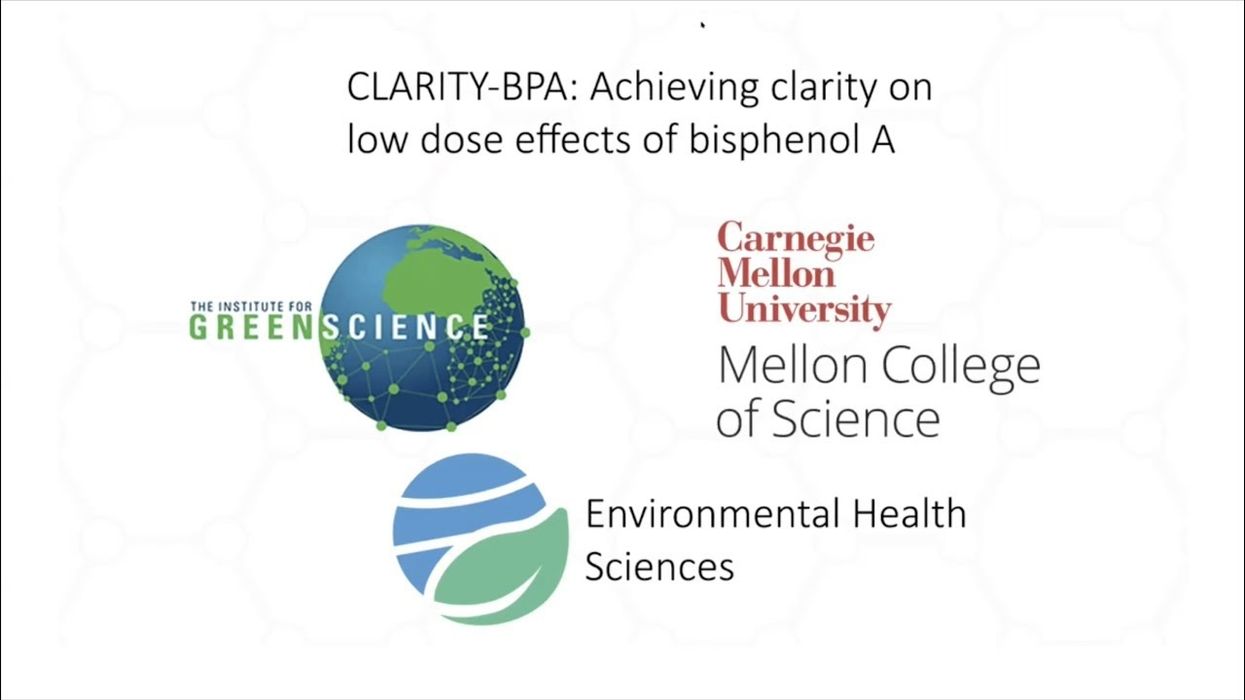Carnegie Mellon University's Institute for Green Science, together with Environmental Health Sciences, publisher of EHN.org, hosted a webinar Wednesday to discuss data emerging from a federal review on the health effects of low-level exposure to bisphenol A.
Six years ago three federal agencies launched an ambitious research effort to examine why different research showed vastly different test results on the safety of the ubiquitous endocrine-disrupting chemical called bisphenol A.
In the webinar, several senior researchers review that effort, overing an overview of core data from research by the U.S. Food and Drug Administration as well as the National Toxicology Program, plus the research of the 14 independent laboratories.
EHS founder Pete Myers moderated. The webinar was held on Sept. 12. Click here to view the full session.
Speakers include:
- Jerrold Heindel, former director of the Reproductive and Developmental Toxicology Group at the U.S. National Institute of Environmental Health Sciences
- Laura Vandenberg, associate professor at the Department of Environmental Health Sciences at the University of Massachusetts, Amherst
- Gail S. Prins, the Michael Reese Professor of Urology and Physiology at the University of Illinois at Chicago and the co-director of the Chicago Center for Health and Environment in the UIC School of Public Health.
- Patricia Hunt, the Meyer Distinguished Professor in the School of Molecular Biosciences at Washington State University in Pullman, Wash.
Known commonly as "BPA," bisphenol A is widely used in plastics, receipt paper and canned food linings, where it leaches into our bodies. Virtually everyone in the world has trace amounts of BPA in their blood.
Studies used traditionally by regulatory agencies show that such low-level exposure to BPA is safe. But research funded by NIEHS and conducted by independent academic experts using methods that account for endocrinological principles repeatedly show diverse adverse health effects from these low-level exposures.
The webinar speakers discussed the successes and shortcomings of the federal effort—known as "CLARITY-BPA"—and shared conclusions on the weight of the evidence on low level exposures to BPA.
To view the webinar, catch it here on YouTube.
Information about Bisphenol A
Onundi et al. 2017 A Multidisciplinary Investigation of the Technical and Environmental Performances of TAML/Peroxide Elimination of Bisphenol A Compounds from Water: Destruction, Oligomerisation, Mechanisms, End Product Toxicity and Applications. Green C. (see reviews within of environmental occurrences and toxicity of BPA).
Information about endocrinological principles
The federal effort to reconcile BPA science

The National Institute of Environmental Health Sciences, the U.S. National Toxicology Program, and the U.S. Food and Drug Administration launched an effort to reconcile the science on BPA's health impact in 2012. Results of this effort, known as "CLARITY-BPA," are just coming into focus.
On Thursday, Sept. 13, the three federal agencies will hold a webinar to discuss preliminary findings. More information, including how to register, is here on the FDA's website.
Sept. 12: This story was amended to correct the name of the National Toxicology Program

















